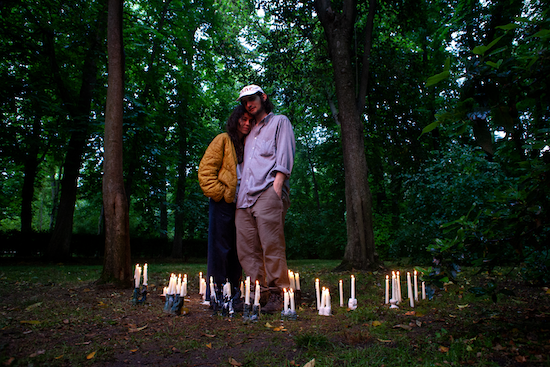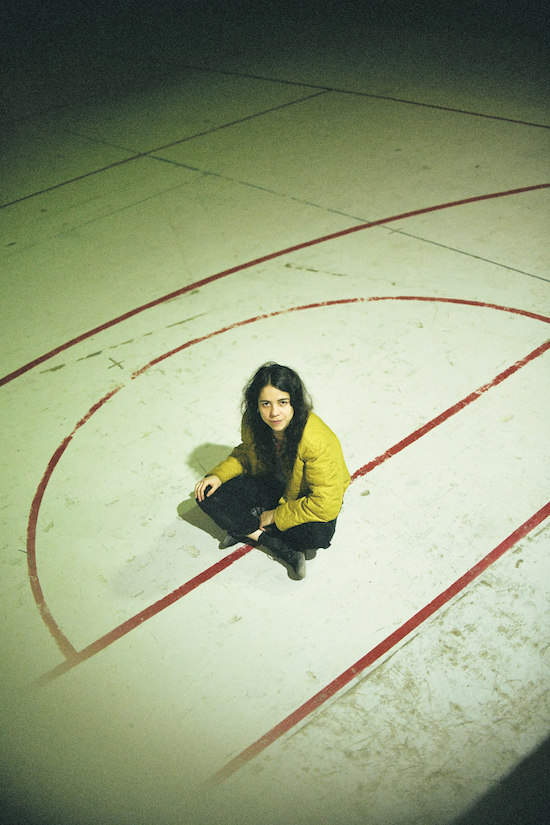A performance from Guatemala-born, now Mexico-based experimental cellist Mabe Fratti is always spellbinding, but at this year’s edition of Unsound Festival – taking place this week in Krakow – she’s set to deliver something extra special. A one-off show conceived with regular collaborator Hector Tosta, aka I. La Católica, Polish experimental percussionist Hubert Zelmer and an array of horn players from Kraków’s Spółdzielnia Muzyczna contemporary ensemble, it will see Fratti performing material she’s never before had the resources to express onstage as well as re-contextualised favourites from her remarkable discography thus far. In addition, the gig will see the premiere of a specially-commissioned new track ‘Cracovia’ – partly inspired by David Bowie’s paean to another Polish city, ‘Warszawa’.
The special show comes off the back of Fratti’s acclaimed 2022 LP Se Ve Desde Aquí, and ahead of not one, but two forthcoming collaborative records. Titanic, her two-piece project with Tosta, release their first album Vidrio on 20 October, while her quartet Amor Muere (with Gibrana Cervantes, Concepción Huerta, and Camille Mandoki) release their own debut A Time To Love, A Time To Die on 2 November.
Set to be one of the highlights at this year’s Unsound, Fratti and co join an imperious line-up under the theme of ‘Dada’ that includes Autechre (for whom Fratti’s show also serves as opener), Lee Gamble, Lonnie Holley, Tirzah, Kasimyn, Bill Orcutt and more, as well as talks and workshops. For tickets, the full line-up and further information, click here.
Ahead of the show, tQ caught up with Fratti, Tosta and Zelmer over a mixture of Zoom calls and emails in order to find out more about what we can expect.
The performance is going to be a one-off, can you tell us more about what we can expect?
Mabe Fratti: Hector Tosta and I play together regularly – he’s I. La Católica – and we’ve also been making arrangements for the Spółdzielnia Muzyczna contemporary ensemble that will be two French horns, a flute and a trumpet. Hubert Zemler is playing percussion and vibraphone. We’re going to play songs that we don’t play live regularly because of the technical requirements, especially from the most recent record Se Ve Desde Aquí This is a great opportunity to do something special and different. These arrangements are also going to change the songs that we already play, because we’re trying to take advantage of having an ensemble like this.
Hubert Zemler: This year I will perform at Unsound twice. First as the duo OPLA with guitarist Piotr Bukowski where we’ll perform a live interpretation of our third album GTI which was released earlier this year on Pointless Geometry. It reconsiders traditional Polish dance, continuing the story of folk music from the deep countryside with broken beatbox rhythms, synthesisers and mangled guitars. Then I’ll be preparing for the concert with Mabe Fratti which I can’t wait for. Mabe’s music is extremely inspiring, it leaves a lot of space for improvisation while remaining formally very coherent.
How was this one-off lineup arranged?
MF: The festival asked us, “What would you like? Any instruments in particular? If you want percussion can I recommend some musicians?” So out of that I came up with the idea of the horns. I’m a big fan of French horns and the flute as well, they’re very epic, so they’ll shift the sound. With Hubert, Mat [Schulz, Unsound co-founder and artistic director] showed me a video and I thought his approach to percussive instruments is very special, all about resonance and repetition, but he’s also an improviser. We’ve given him broad rules to improvise with, but I don’t know how it’s going to sound on his behalf.
HZ: I was very happy about this offer. Her music really appeals to me, even if my knowledge of Spanish is too low to catch the nuance of the lyrics. Mabe and I agreed that, in addition to the drums, I would also use a vibraphone to expand the band’s timbral possibilities. The additional presence of the Spółdzielnia Muzyczna contemporary ensemble promises a truly beautiful concert.
I. La Católica: We have been doing the arrangement for the horn section to conceptualise the set and take it to another place. I feel that it’s going to be pretty epic, it’s sounding like some kind of futuristic movie soundtrack.
It must be exciting to have the chance to realise songs live you’ve not been able to until now.
MF: Definitely, and these are all songs I really like, for example the last song on my latest record called ‘Siempre Tocas Algo’, but couldn’t play live because I wanted to find the correct moment to do it. That one also became something else with the arrangements, it’s shifted and transformed a lot in a good way.
Was the idea of adding a horn section something you’d thought about previously?
MF: We had the chance to play with another ensemble a month ago for a festival called Gaudeamos, with strings, another cello and violin, and I loved it. I feel that with other strings there’s an ease for the cello, it reinforces the texture. I also thought that maybe we had to do something with horns too, but because of budget we couldn’t have the whole ensemble. So before this opportunity it was already in my mind because I really love the sound of horns.
Have you played Unsound before? What’s your relationship with the festival like?
MF: The first time we played was this year at the Australian edition, where we spent some time meeting with Mat and Gosia [Plysia, Unsound co-director]. I loved it, it felt like a beautiful place to hang out with other musicians.
ILC: I will never forget that opportunity, to get to know so many musicians from all around the world was so special and also to get to know Mat and the organisation was super special too. I really felt all the love and the care that the festival puts into the music and the artists. It’s the best festival that I have been involved with.
HZ: I have been performing regularly at Unsound for many years, from my solo sets in 2012 and 2018 through concerts with Piotr Kurek and Kamil Szuszkiewicz to performances with Todd Barton for Music And Poetry Of The Kesh in 2019 and Robert Aiki Aubrey Lowe for his Candyman live score in 2021. I’ve been to many festivals around the world in my life, but at Unsound I feel at home with a musical family. A week filled from morning to evening with wonderful music. It’s unique.
MF: This time we’re opening for Autechre, we feel great about that, super nervous and excited. I just hope not to be totally out of my head when we play!

Mabe Fratti and I. La Católica as Titanic, photo by José Ostos
Mabe, you’re releasing so much work at the moment, you’ve got new albums out soon both with your Titanic project with I La Católica, and with the group Amor Muere. Is it important to you to keep switching up your collaborators at the same time as pursuing your solo work?
MF: These are things that just happen, but I like the opportunities with collaborating. Whenever I get the chance I take advantage of it, because you’re putting stuff in a different context. I recently did vocals for a friend I’ve known for a long, long time, who makes very dancey music, a bit like 90s house. It was super out of my comfort zone, but I ended up really liking it. It makes me feel very self aware, so whenever I go back [to playing solo] I have all these new tools in my head.
So often when the cello is included as part of a larger ensemble it’s used to augment and complement what’s already there, but what’s effective about so much of your work is the way the instrument is placed right at the centre.
MF: Well for me that’s because it’s my instrument. I really like the timbre of the cello. It’s not like I made a brainy decision to say, "OK, make the cello the centre," but aesthetically I really enjoy using it for creating the melodies. I create my music by playing and by singing, and I’ve noticed that a lot of how I sing depends on the technical aspects of the cello. There are also limitations, like with a guitar your melodic constraints are less because you’ve got more notes to think about, but with the cello the biggest chord you can make is only four notes. Maybe that’s why people tell me that I’m very modal in the way I sing and create melodies. Having the cello as my main instrument has influenced all the other aspects of my music.
Why bring I La Católica on board for this particular project?
MF: He’s played with me for two years or so, he’s a great guitarist, piano player and a composer as well. So for me it’s beautiful to collaborate with him in these situations. He has the knowledge to say, "Look, this chord could be better," or to come in with an arrangement where I’m like, "Yeah, that’s perfect." We have a lot of chemistry musically. He made a song called ‘Cracovia’ especially for the festival.
ILC: I really love the vision that Mabe has on her music, and I have been playing with her since I meet her. That was when she was about to release her second album, and since then I have been involved in the production and in the recordings too.
Can you tell me more about that new track, ‘Cracovia’?
So we were saying, “OK, we have to take advantage of these horns. We were also listening to Low by David Bowie where he has that song ‘Warszawa’. I love that song, and I said to Hector, “Do something like that!” So he came up with this very beautiful melody and an arrangement for the ensemble. We’ve been rehearsing it in the house and it sounds beautiful.
Mabe Fratti plays as part of this year’s Unsound festival, which takes place until 8 October. For tickets and full information, click here.


